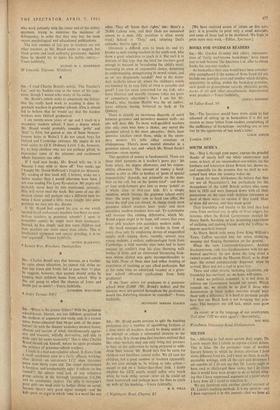Sta,—Where is the greater failure? With the grammar school-leaver, literate,
not too diffident, practised in the methods of argument and study, and, in a formal sense, better-educated than 90 per cent. of the popu- lation? Or with the dimmer secondary modern leaver. obscene and narrow of mind, simultaneously aggres- sive and insecure, wilfully destructive, and able to write only his name accurately? This is what Charles Brand should ask himself, before he again proclaims the primacy of grammar-school teachers. I teach in a bad non-selective school, It draws from a small catchment area in a fairly affluent working- class district—an out-county LCC slum clearance estate now thirty years old. The visual environment Is formless, and irredeemably ugly: it reflects (or has caused?) the almost total lack of any voluntary group activity in the borough (population 114,200, and no community centre). The telly is 'everyone's great gOd—rio need even to bother abiiut an aerial, because there's very good signal strength- -and the kids speak an argot in which 'omo' is a word like any
other. They all 'know their rights,' too: there's a 20,000 Labour vote, and their Dads are unionised almost to a man. (My socialism is often sorely tried.) School = 'They,' and, adopting Dad's attitudes, they're agin it.
Obviously a difficult area to teach in; and it's known as such among teachers in the south-cast, who show a great reluctance to teach, in it. But isn't it in districts of this type that the need for teachers good enough to succeed in 'broadening the child's mind, increasing its sense of responsible choice, deepening • its understanding, strengthening its moral values, and so on' are desperately needed? And in the secon- dary moderns above all, where the children's minds are touched by so very little of what is valuable and good? I am far more concerned for my kids, who leave illiterate and morally vacuous (after ten years of compulsory education!) than I am for Mr. Brand's, who because Hazlitt was the set author, leave without having bothei•ed to look at De Quincey.
There is already an enormous disparity of merit between grammar and secondary modern staffs—no one will deny this. To most well-qualified teachers (the only ones who have a choice, any more) the grammar school is the more attractive: there, keen attentive scholars await them, while in the secon- dary modern it's yobs either comatose or obstreperous. There's more mental stimulus in a grammar school, too, and—which Mr. 'Brand doesn't Mention—more money.
This question of money is fundamental. There are three chief elements in a teacher's gross pay : his basic salary, his degree allowance, and his respon- sibility allowana. The amount- of money a head- master is able to offer to holders of 'posts of special responsibility' depends, not primarily on the num- bers on his roll, but on his 'points total': and three or four sixth-formers give him as many 'points' as a whole class of first-year kids. It's a simple equation, which favours the grammar school every time : the more 'posts' you as head can offer, the better the staff you can attract. As things stand, most grammar school teachers have 'posts' and most secondary modern teachers have not. To systematise and increase this existing differential, which Mr. Brand argues ought to be done, will ensure that even fewer able teachers join secondary modern staffs.
My head manages to put a teacher in front of every class only by employing droves of unqualified supply staff—among them, recently, several very young students, a sadistic anthropologist fresh from Cambridge, a mild neurotic man (who had to leave because he couldn't stop his class throwing milk bottles at him), and an abstracted blarneying Irish- man .whose dialect was quite incomprehensible to the kids. None of these men had either training or experience of teaching or .any allied profession. But at the same time an advertised vacancy at a gram- Mar school attracted applications from forty graduates!
If the 'basic salary for graduates in a grammar school were £1,000' (Mr. Brand's italics), and the increase were not general throughout the profession. would this disturbing situation he remedied?—Yours faithfully,
SECONDARY MODERN TEACHER






































 Previous page
Previous page